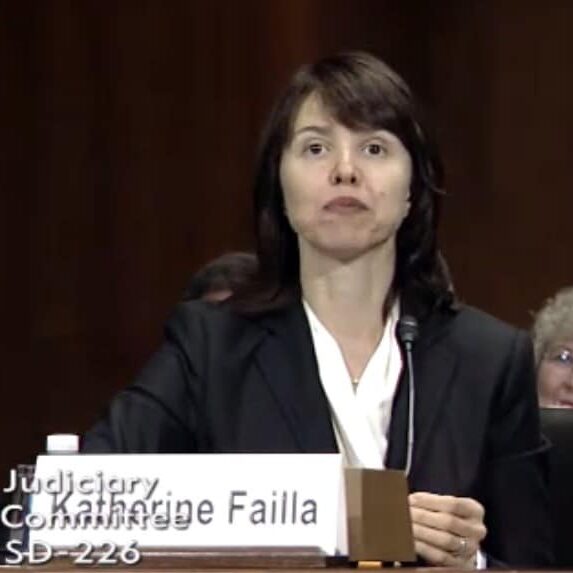In a high-profile courtroom clash this Wednesday, the U.S. Securities and Exchange Commission (SEC) primarily was on the receiving end of pointed questions from a federal judge after the crypto exchange Coinbase sought to have charges that it was operating as an unregistered broker dismissed on the grounds that the SEC was outside of its jurisdiction.
Presiding in the Thurgood Marshall Courthouse in downtown Manhattan, Judge Katherine Polk Failla of the U.S. District Court for the Southern District of New York pointedly expressed concerns about whether the SEC’s litmus test for what defines a security is “sweeping too broadly” and could include popular collectibles like Beanie Babies.
The SEC filed a complaint in June 2023 against Coinbase for operating as an unregistered broker, national securities exchange and clearing agency, alleging that the publicly traded crypto exchange allowed securities to be traded on its platform. The commission specifically named the tokens SOL, ADA, MATIC, FIL, SAND, AXS, CHZ, FLOW, ICP, NEAR, VGX, DASH and NEXO as crypto asset securities.
In response, Coinbase asked the judge to dismiss the case on the grounds that the SEC is stepping outside its jurisdiction.
Failla, whose questions were 14 pages long, challenged the SEC and Coinbase to define security transactions and argue whether the largest cryptocurrency exchange in the United States by trading volume permitted them on its platform.
SEC in the Hot Seat
The commission admitted that the tokens, in and of themselves, do not constitute a security. However, it argued that when a person purchases one of these tokens on Coinbase, they are effectively buying and investing in an ecosystem where the conduct of the players represents an investment contract and therefore the trading of the tokens then falls under the SEC’s jurisdiction.
“As the value of that network or platform or ecosystem increases, so does the value of the token,” Patrick Costello, SEC’s assistant chief litigation counsel, said. The issuers and the project team drive the value of the ecosystem, “so your token being part of this ecosystem going up or down in value is based entirely on what these issuers and project team members are doing and continuing to do. So it is their conduct that would be relevant for the Howey analysis,” he added.
The Howey Test, established by the U.S. Supreme Court in the 1946 case of SEC v. W.J. Howey Co, is a legal framework that helps regulators determine whether a transaction qualifies as an investment contract subject to regulation in the United States.
Read more: The Howey Test and the Debate Over Crypto’s Legal Status
Failla said she had a “real fear” that the SEC’s argument is “sweeping too broadly” and expressed concerns about whether their definition of a security would include collectibles like Beanie Babies and commodities. The agency responded by emphasizing the role of an enterprise behind an asset, not the item or thing itself.
“It’s not just buying something and expecting it to go up [in price], there has to be this notion of the enterprise. Now, what is the enterprise here? What is distinguishing these 13 tokens from a collectible?” asked Costello. “It’s the ecosystem, where you are buying into that ecosystem with your token. The token is the key that gets you into this ecosystem… the token would be worthless without the ecosystem,” he answered.
Since tokens are connected to a blockchain network, transacting these tokens can be considered investment contracts, according to the SEC.
Coinbase Showing Force
Coinbase’s lawyers pushed back. Despite acknowledging the possibility that transactions involving digital assets could be investment contracts, Coinbase’s legal team indicated that the particular transactions at issue in the case do not implicate securities laws.
“We do contend with force, that the tokens that trade on Coinbase’s secondary market that are before the court in the complaint are not, as a matter of law, investment contracts and therefore non securities,” said William Savitt, a Wachtell, Lipton, Rosen & Katz attorney representing Coinbase.
While tokens are involved in an ecosystem and can appreciate as a consequence of the issuers and project team, it “isn’t enough,” Savitt argued. What is missing is an element of enforceability in the investment contract. “There has to be a statement that is meant to convey an enforceable promise… That’s the irreducible minimum of what could be conceived to be an investment contract.”
Since the token transactions on Coinbase’s secondary markets don’t have “a contract of any kind, anywhere in the vicinity… you don’t have an investment contract,” added Savitt.
Failla, near the end of her questions directed at Coinbase, asked Sarah K. Eddy, a partner in the Litigation Department at Wachtell, Lipton, Rosen & Katz, what about crypto is qualitatively different than other assets the SEC has considered and regulated over time.
“It’s not what makes crypto special. It’s the nature of the transaction that the SEC is now designating and calling a security that it didn’t designate or recognize as a security in any of its prior briefing over the 90-year history of the Exchange Act and in Chair Gensler’s comments to Congress,” said Eddy.
“This is a special kind of transaction. It’s one that doesn’t have an ongoing legal relationship between the issue and the purchaser. So that is a class of transaction that is an issue here and the SEC is offering an interpretation through a campaign of enforcement actions that is not just arrogating authority to itself, it is expanding its jurisdictional perimeter,” she added.
Failla, who sat in the courtroom for more than four hours presiding over the arguments, did not decide today whether to dismiss the SEC’s lawsuit against Coinbase. It is unclear when she will make her decision known.



